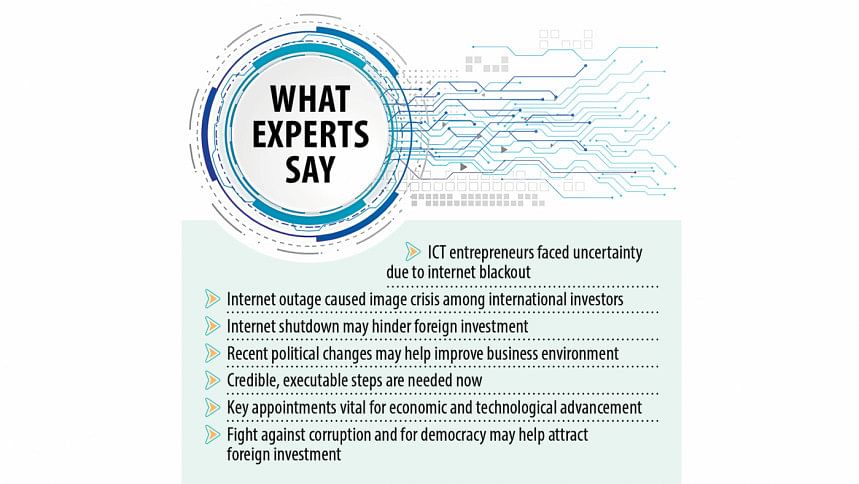ICT industry sees hope on the horizon

ICT entrepreneurs in Bangladesh, who faced uncertainties due to an internet blackout enforced by the government to suppress protests in recent weeks, are now brimming with hope following the fall of the dictatorial Sheikh Hasina-led government.
They now seek stability, good governance, democracy and reforms.
Just last week, there were fears that they might fail to attract foreign investments and lose foreign clients amidst the deepening political crisis and government crackdown on students.
Now, with the imminent positive changes expected from an interim government which is set to be formed, they anticipate good policies and a business-friendly environment.
"The transformational change we witnessed over the past few days, brings with it the opportunity to retell our story to the outside world, including global venture capital investors," said Fahim Ahmed, CEO of ride-sharing, food delivery and courier service platform Pathao.
"But for that story to be compelling, credible and executable, we must soon demonstrate meaningful steps towards building the institutions that can create a business environment that is open and transparent, and nurtures skill, innovation and enterprise," he said.
He said the first among such steps are the appointments to key positions at the institutions that will shape the trajectory for the economy, the financial system, and technology sector.
"Now more than ever, we must earn back the confidence of our promising young entrepreneurs, leaders, builders, coders, operators and professionals so that they choose to pursue their aspirations in Bangladesh," Ahmed said.
Startup entrepreneurs who were dejected just before the fall of the government are now becoming optimistic with the hope of democracy returning.
For example, Morin Talukder, co-founder and CEO of the online shopping platform Pickaboo, said on August 1, "Due to the internet blackout, we are now suffering from an image crisis,"
"In the last few days, I spoke to some investors, and they are not interested in talking about business. They just ask if I am fine," he said. "When I used to pitch to foreign investors, I would say we are a very stable country."
"We have lost the trust of the international community. Our market was not good, the e-commerce industry was struggling to grow, and now there is another blow," Talukder continued.
He said that international investors prefer countries with good policies, infrastructure, and a favorable business environment.
Talukder is now very optimistic.
"With the new Bangladesh, I'm sure we will be able to recover faster. Initially, on the first day of the collapse, everyone was concerned, but with time, when the new interim government was declared, it gave new hope and boosted everyone's confidence," he said on August 9.
Fahim Mashroor, CEO of bdjobs.com, said the ICT industry has gone through a very tough time in the last few years.
"Apart from the blow in the last few weeks, industry has been hit very hard because of a lot of issues, including Covid-19 and the Russia-Ukraine war. The government talked a lot about digital Bangladesh and Smart Bangladesh," he said.
"But very few things have happened. A lot of government money has been wasted. Political people looted government ICT funds," he said.
"I think all industry people are excited because they feel that corruption in the sector will come down. Also, democracy and stability will attract a lot of foreign investment in tech startups," said Mashroor.
"The local ICT market will also grow if governance and transparency are ensured," Mashroor added.
Waseem Alim, CEO of grocery e-commerce platform Chaldal, said the biggest challenge now was to regain the confidence of international investors.
"It will take some time to recover," he added.
The startup funding landscape in Bangladesh has already been experiencing a significant downturn.
In the first quarter of 2024, Bangladesh's startup sector secured only $7 million across four deals, according to the Bangladesh Startup Investment Report 2024 by LightCastle Partners.
This illustrates a 70 percent quarter-on-quarter decline in funding, a substantial drop from the surge witnessed in the fourth quarter of 2023, it said.
The decrease is even more significant when compared to the same period last year, representing an 82 percent drop.
The government shut down mobile internet services on July 17 amid widespread violence over the quota reform protests.
A day later, on July 18, broadband internet was blocked, severely affecting public life and a wide range of economic activities, including utility bill payments, online banking, digital communications, digital commerce and clearance of goods from ports.
Mobile internet was restored on July 28 while social media platforms were unblocked on July 31. Mobile internet users were unable to access their Facebook and Messenger accounts for approximately 7 hours on August 2.
Mobile internet and Facebook were blocked again on August 4.
On August 5, mobile and broadband internet was blocked again for a few hours. However, the internet was fully restored after 2:00pm, when Sheikh Hasina resigned from the post of prime minister and fled the country.

 For all latest news, follow The Daily Star's Google News channel.
For all latest news, follow The Daily Star's Google News channel. 



Comments